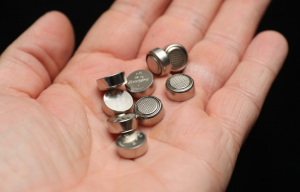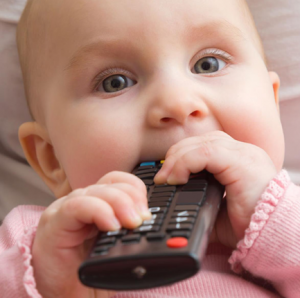Button Battery Dangers for children
Button batteries are in so many products; watches, greeting cards, key fobs and remote controls for example.
Thanks to the tireless work of parent advocates; consumer products, such as remote controls, light-up shoes and greeting cards, face safety testing to ensure that younger children can’t access the batteries. Nevertheless children have died, and many have found themselves in accident and emergency departments, after swallowing button batteries.
Why are button batteries dangerous?
Chemicals in the batteries can cause serious burns when swallowed or stuck in the body. A swallowed button battery or one that’s stuck in the nose or ear can cause a very serious injury. A swallowed button battery or one in the nose or ears is an emergency.
The button battery may have caused significant damage to the lining of the child’s oesophagus (foodpipe) – in some cases it may have burned through the oesophagus completely to form a hole. This may create a passage (fistula) between the oesophagus and the trachea (windpipe). It may also have damaged the vocal cords.
Damage can happen as quickly as one hour after being swallowed. A button battery can cause damage in three ways: First, it can create electrical current. Second, it can put pressure on sensitive tissues and third, it can leak harmful chemicals from the battery. And all of these can cause burns to the throat or the stomach.
How do I keep my child safe?
There are lots of things we can do to reduce the risk of a child swallowing a battery:
- Keep new batteries in their original blister packaging out of the sight and reach of children.
- Tape down battery compartments if possible or keep the entire watch or key fob out of sight and reach of children.
- Only buy toys and other equipment from reliable sources – they are more likely to have passed safety regulations.
- When a battery has died, dispose of it safely straightaway – do not store them up to dispose of in one go. Batteries should not be put in the household rubbish but put into special disposal containers in your local area. Many supermarkets have battery disposal bins so see what is available when you next visit. You could also check your council’s website for details of your nearest one.
- Share information about safe battery usage and storage with friends and family to spread the word about how dangerous batteries can be to children.
What happens if my child swallows one?
- If you suspect your child has swallowed a button battery, you should take them to your nearest Accident and Emergency (A&E) department as quickly as possible.
- Do not give them anything to eat or drink or try to make them sick as this could cause damage as the battery is vomited back up as well as the damage it caused when swallowed.
- If possible, try to find out what sort of battery your child swallowed but do not delay taking them to hospital if you cannot immediately see what they have swallowed.
Sometimes, symptoms of swallowing a button battery do not become immediately obvious. Children may have breathing difficulties or be generally unwell. If the swallowed button battery starts to cause problems, children may cough up or vomit blood. Batteries inserted into the nose or ear can also cause problems, such as nose bleeds or bleeding from the ear.



